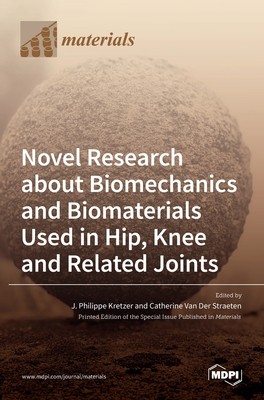
- We will send in 10–14 business days.
- Publisher: MDPI AG
- ISBN-10: 3036512810
- ISBN-13: 9783036512815
- Format: 17 x 24.4 x 2.9 cm, hardcover
- Language: English
- SAVE -10% with code: EXTRA
Novel Research about Biomechanics and Biomaterials Used in Hip, Knee and Related Joints (e-book) (used book) | bookbook.eu
Reviews
Description
Joint replacement is a very successful medical treatment. However, the survivorship of hip, knee, shoulder, and other implants is limited. The degradation of materials and the immune response against degradation products or an altered tissue loading condition as well as infections remain key factors of their failure. Current research in biomechanics and biomaterials is trying to overcome these existing limitations. This includes new implant designs and materials, bearings concepts and tribology, kinematical concepts, surgical techniques, and anti-inflammatory and infection prevention strategies. A careful evaluation of new materials and concepts is required in order to fully assess the strengths and weaknesses and to improve the quality and outcomes of joint replacements. Therefore, extensive research and clinical trials are essential. The main aspects that are addressed in this Special Issue are related to new material, design and manufacturing considerations of implants, implant wear and its potential clinical consequence, implant fixation, infection-related material aspects, and taper-related research topics. This Special Issue gives an overview of the ongoing research in those fields. The contributions were solicited from researchers working in the fields of biomechanics, biomaterials, and bio- and tissue-engineering.
EXTRA 10 % discount with code: EXTRA
The promotion ends in 18d.21:38:14
The discount code is valid when purchasing from 10 €. Discounts do not stack.
- Publisher: MDPI AG
- ISBN-10: 3036512810
- ISBN-13: 9783036512815
- Format: 17 x 24.4 x 2.9 cm, hardcover
- Language: English English
Joint replacement is a very successful medical treatment. However, the survivorship of hip, knee, shoulder, and other implants is limited. The degradation of materials and the immune response against degradation products or an altered tissue loading condition as well as infections remain key factors of their failure. Current research in biomechanics and biomaterials is trying to overcome these existing limitations. This includes new implant designs and materials, bearings concepts and tribology, kinematical concepts, surgical techniques, and anti-inflammatory and infection prevention strategies. A careful evaluation of new materials and concepts is required in order to fully assess the strengths and weaknesses and to improve the quality and outcomes of joint replacements. Therefore, extensive research and clinical trials are essential. The main aspects that are addressed in this Special Issue are related to new material, design and manufacturing considerations of implants, implant wear and its potential clinical consequence, implant fixation, infection-related material aspects, and taper-related research topics. This Special Issue gives an overview of the ongoing research in those fields. The contributions were solicited from researchers working in the fields of biomechanics, biomaterials, and bio- and tissue-engineering.


Reviews